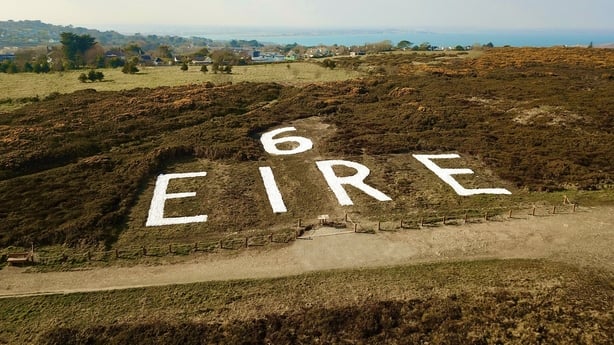President Michael D Higgins has said there should be a special role for countries who embrace neutrality in making a case for diplomacy in the war in Ukraine.
President Higgins was speaking at an event in Dublin to mark the restoration of an aerial sign which advertised Ireland's neutrality during World War II.
The Eire 6 sign, which is located on the east side of Howth head, was built in 1943 and is one of 83 erected around the country during WWII to tell passing pilots they were passing over neutral territory.
After the war it became hidden in the undergrowth, until it was revealed by a gorse fire in 1982.

After a number of years' work by the local community it was restored to its former glory.
Today President Higgins and the Chief of Staff of the Defence Forces Lieutenant General Sean Clancy attended a ceremony to mark its unveiling, which featured a fly-past by the Air Corps.
Family members of the local Coast Watch Service, which monitored the skies and recorded the movements of Allied and German aircraft during the Emergency, were presented with commemorative medals to mark the occasion.
Historian Dr Michael Kennedy said the work of the locals had saved an "outstanding national artefact".
The Howth Eire sign symbolises Ireland’s neutrality during WWII but its restoration comes at a time when Ireland’s neutral status is under fresh scrutiny.
In his speech, President Higgins said neutral countries have an important role in the war in Ukraine.
"I think there is a special role for peoples and countries who embrace neutrality to be active in making the case for diplomacy to the very end," he said.
The Irish Air Corps fly over the newly-restored Eire 6 wartime neutrality sign in Howth. pic.twitter.com/ctRm8umMe7
— RTÉ News (@rtenews) April 9, 2022
Minister for Housing Darragh O'Brien, who also attended the event, said while Ireland’s neutrality should be debated the policy is unlikely to be dropped.
"The Taoiseach said, and I agree with him, that there should be a discussion on the future of neutrality and what that looks like in Ireland. That doesn’t mean ditching neutrality in any way shape or form, I don’t see that. But our role in Europe and defending European values - because the values we in many instances sometimes is taken for granted - around democracy and free speech are under attack," he said.
Dr Kennedy said any future discussion of Irish neutrality should look carefully at how past policy was established.
"Neutrality was part of state policy during the Second World War but it was only meant to last as long as the Second World War lasted.
"After the war there was a fundamental rethink of defence policy and of foreign policy and it was by say no means clear that Ireland would have remained neutral in a Third World War.
"In fact in 1948 and 1949, Ireland looked very seriously at joining NATO," he added.






